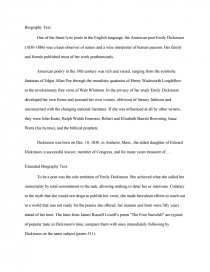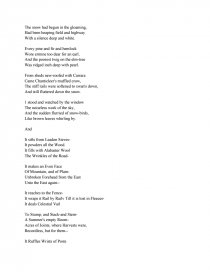Biography of Emily Dickinson
Essay by review • November 8, 2010 • Essay • 557 Words (3 Pages) • 2,047 Views
Biography Text
One of the finest lyric poets in the English language, the American poet Emily Dickinson (1830-1886) was a keen observer of nature and a wise interpreter of human passion. Her family and friends published most of her work posthumously.
American poetry in the 19th century was rich and varied, ranging from the symbolic fantasies of Edgar Allan Poe through the moralistic quatrains of Henry Wadsworth Longfellow to the revolutionary free verse of Walt Whitman. In the privacy of her study Emily Dickinson developed her own forms and pursued her own visions, oblivious of literary fashions and unconcerned with the changing national literature. If she was influenced at all by other writers, they were John Keats, Ralph Waldo Emerson, Robert and Elizabeth Barrett Browning, Isaac Watts (his hymns), and the biblical prophets.
Dickinson was born on Dec. 10, 1830, in Amherst, Mass., the eldest daughter of Edward Dickinson, a successful lawyer, member of Congress, and for many years treasurer of.....
Extended Biography Text
To be a poet was the sole ambition of Emily Dickinson. She achieved what she called her immortality by total commitment to the task, allowing nothing to deter her or intervene. Contrary to the myth that she would not deign to publish her verse, she made herculean efforts to reach out to a world that was not ready for the poems she offered; her manner and form were fifty years ahead of her time. The lines from James Russell Lowell's poem "The First Snowfall" are typical of popular taste in Dickinson's time; compare them with ones immediately following by Dickinson on the same subject (poem 311):
The snow had begun in the gloaming,
Had been heaping field and highway
With a silence deep and white.
Every pine and fir and hemlock
Wore ermine too dear for an earl,
And the poorest twig on the elm-tree
Was ridged inch deep with pearl.
From sheds new-roofed with Carrara
Came Chanticleer's muffled crow,
The stiff rails were softened to swan's down,
And still
...
...


